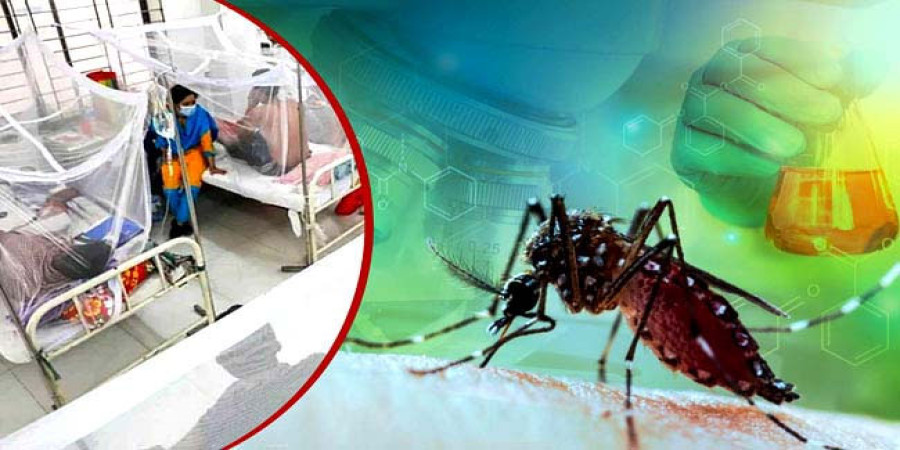
ছবি: imaginary photo
The dengue epidemic in Bangladesh continues to wreak havoc, with 10 more fatalities and 886 new hospitalizations reported in the past 24 hours. The latest data, released on Saturday evening by the Health Emergency Operation Center and Control Room of the Directorate General of Health Services (DGHS), highlights the unrelenting severity of the outbreak.
Current Situation: Rising Cases and Hospitalizations
Of the 886 new dengue patients, 373 were admitted to hospitals in Dhaka, while the remaining cases were reported from outside the capital. Simultaneously, 938 patients were discharged after recovering from the mosquito-borne illness.
Since the start of 2024, a total of 85,712 individuals have been hospitalized due to dengue. Among them, 81,456 have recovered and returned home. However, the disease has claimed 448 lives so far this year, marking a grim milestone in the country’s ongoing battle against dengue.
The peak dengue season, which coincides with the monsoon, has seen a sharp increase in cases since June 2024. Experts fear the situation may deteriorate further as the season progresses, demanding immediate and coordinated public health interventions.
Historical Context: A Decade of Dengue’s Deadly Toll
Bangladesh has been grappling with recurring dengue outbreaks for over a decade, with the situation worsening in recent years.
2023: The most catastrophic year in the country's history, with a record 321,179 dengue hospitalizations. Among these, 110,008 were reported in Dhaka, while 211,171 cases were from outside the capital. Tragically, the death toll reached 1,705, marking the highest annual fatalities due to dengue in Bangladesh. Despite the grim numbers, 318,749 patients managed to recover.
2019: Before 2023, the largest outbreak occurred in 2019, with 101,354 reported cases and nearly 300 deaths, including healthcare workers and doctors.
2020-2021: The COVID-19 pandemic temporarily reduced dengue cases in 2020. However, the situation rebounded in 2021 with 28,429 reported cases and 105 deaths.
2022: Dengue resurged with 62,382 cases and 281 fatalities, underscoring the persistent challenges in controlling the disease.
Factors Behind the Escalation
The rise in dengue cases is attributed to several factors, including urbanization, inadequate waste management, and climate change. The Aedes mosquito, the primary vector for dengue, thrives in stagnant water, which is abundant during the monsoon season.
Public health experts have noted that the lack of proper mosquito control measures, especially in urban areas like Dhaka, has significantly contributed to the epidemic. Despite awareness campaigns, improper waste disposal and stagnant water in residential and commercial areas continue to provide breeding grounds for the Aedes mosquito.
The year 2024 has seen alarming rates of dengue infections since June. Hospitals across the country are struggling to accommodate the influx of patients, with many facilities reporting overcrowded wards and shortages of critical medical supplies.
The DGHS has emphasized the importance of timely hospital admissions for severe cases to prevent fatalities. Symptoms of dengue include high fever, severe headache, muscle and joint pain, nausea, and rashes. In extreme cases, dengue can lead to severe complications like hemorrhagic fever and organ failure.
Authorities are ramping up efforts to combat the outbreak, including:
- Community Awareness: Campaigns to educate the public on preventing mosquito breeding, recognizing symptoms, and seeking timely medical care.
- Vector Control: Intensified fumigation and mosquito control activities, especially in high-risk areas.
- Healthcare Support: Expanding hospital capacity and providing additional medical resources to manage the surge in cases.
However, experts have pointed out gaps in coordination and resource allocation. While local government bodies are spraying insecticides, these measures are often inconsistent and fail to address the root causes of the epidemic.
The recurring nature of dengue outbreaks highlights the need for sustained long-term strategies. Experts recommend:
- Infrastructure Improvements: Developing drainage systems to prevent waterlogging and reduce mosquito breeding sites.
- Public-Private Partnerships: Engaging businesses and communities in waste management and environmental sanitation initiatives.
- Research and Vaccination: Accelerating research into dengue vaccines and implementing immunization programs in high-risk areas.
- Surveillance Systems: Strengthening disease monitoring and early warning systems to identify and address outbreaks promptly.
As the dengue crisis unfolds, healthcare professionals, government agencies, and citizens must collaborate to mitigate the outbreak’s impact. Simple measures, such as eliminating standing water, using mosquito repellents, and wearing protective clothing, can significantly reduce the risk of infection.
The current outbreak serves as a stark reminder of the urgent need for systemic reforms to combat vector-borne diseases in Bangladesh. With coordinated efforts, it is possible to prevent the recurrence of such devastating health crises in the future.
repoter






